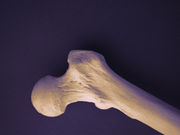Findings in postmenopausal overweight or obese women with vitamin D insufficiency
MONDAY, April 11, 2016 (HealthDay News) — For postmenopausal women with vitamin D insufficiency completing a structured weight-loss program, vitamin D3 supplementation is not associated with changes in lean mass or bone mineral density (BMD), according to a study published online April 5 in the Journal of the American Geriatrics Society.
Caitlin Mason, Ph.D., from the Fred Hutchinson Cancer Research Center in Seattle, and colleagues compared the effects of 12 months of vitamin D3 supplementation with placebo in 218 postmenopausal women aged 50 to 75 years with a body mass index of 25 kg/m² or greater with vitamin D insufficiency. Participants were randomized to oral vitamin D3 or placebo in combination with a lifestyle-based weight loss intervention.
The researchers found that at 12 months there were significantly different changes in 25-hydroxyvitamin D between the vitamin D and placebo groups (13.6 ng/mL versus −1.3 ng/ml; P < 0.001), but no significant differences in the change in lean mass (P = 0.53), BMD of the spine (P = 0.82), or BMD of the right femoral neck (P = 0.49). There was a decrease in leg strength in the vitamin D group but not in the placebo group (P = 0.03). For women randomized to the vitamin D group, results were not altered for those achieving repletion.
“Vitamin D3 supplementation during weight loss decreased leg strength but did not alter changes in lean mass or BMD in postmenopausal women with vitamin D insufficiency,” the authors write.
Copyright © 2016 HealthDay. All rights reserved.








